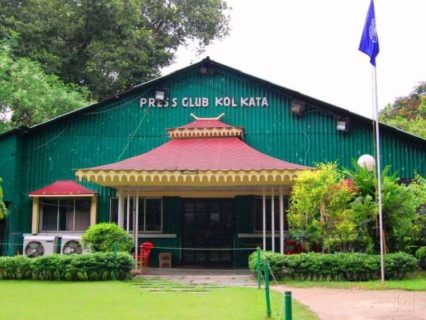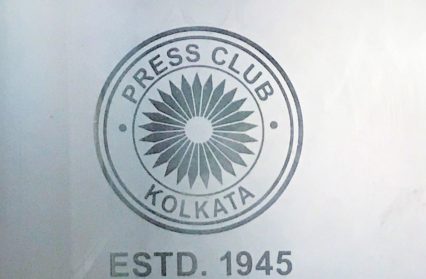As part of the #WalesinKolkata season, Gary Raymond delivered a lecture at the Kolkata Press Club about journalism in the digital age. Here, he discusses the future of ethical and investigative journalism, and the death of the BBC.
 The Kolkata Press Club is the oldest of its type in India, ratified in 1945, sitting in a prefabricated building on the military-owned Maidan field in the heart of the city. The non-permanence is a government stipulation of any edifice on military land, and not a metaphor for the precariousness of the profession of journalism; although it could work just as well as one. In a two-hour visit, that included my talk to a hundred Bengali journalists, editors, and students of journalism, on the subject of storytelling in the digital age, the subject that kept reoccurring in the second half Q&A of the event was the downward spiral of journalism as a viable profession. Like many conversations in India, you are quick to realise that insecurities in the UK are no different to the ones here.
The Kolkata Press Club is the oldest of its type in India, ratified in 1945, sitting in a prefabricated building on the military-owned Maidan field in the heart of the city. The non-permanence is a government stipulation of any edifice on military land, and not a metaphor for the precariousness of the profession of journalism; although it could work just as well as one. In a two-hour visit, that included my talk to a hundred Bengali journalists, editors, and students of journalism, on the subject of storytelling in the digital age, the subject that kept reoccurring in the second half Q&A of the event was the downward spiral of journalism as a viable profession. Like many conversations in India, you are quick to realise that insecurities in the UK are no different to the ones here.
The subject of journalism in the digital age, which formed the front end of my lecture, was obviously particularly pertinent to this crowd, and the casting from which I intended to reel them in for the wider subject of storytelling in general. I began by tracing a brief line from the semi-romanticised newspaper world of old to the all-swallowing social media of now, ending up with the assertion that many modern journalists, in thrall to the allure of immediacy, have bypassed conduits to their reporting of all kinds; fewer now even use social media to link to a longer article – they do their reporting directly through tweets. And twitter threads – long(ish) narrative stories told in mini-chapters – are becoming more and more prominent. Twitter for journalists had been up until recently the thoroughfare where a writer might call a reader into their shop; but now they do their business right out there in the street, as it were.
So where do editors come in all this? I was pushed by members of the audience, some of them in despair, to admit I am an optimist when it comes to history’s patterns. Just as the pushback of anger and insecurity that manifests itself as narrow-visioned far right politics across the world will later be seen by historians as the death throe of vulgar populist politics, so I believe journalism, and the speaking truth to power, will come strong and prevail. The problems of now will be worked out. The catastrophic decision by a panicking Mount Olympus of media organisations twenty-odd years ago to allow the wares of journalists to be accessed for free online will be corrected somehow.
In the UK, the panic was set in motion back then as private news organisations viewed, correctly, that their biggest rival, the BBC, would put its content out for free as part of the licence fee contract. So it’s ironic, isn’t it, that it may be that the decline and eventual fatality of the BBC that sparks the resurgence of ethical and investigative journalism.
This hypothesis always gets the attention of the room, and perhaps it did even more so here in India.
As the BBC currently methodically dismantles its own credibility as a news organisation with its coverage of Brexit, the end of it has never been more likely. For years the right in the UK has tried to kill it, and when they realised they could not, they set about taking it over, and with the new people came the rot. What irony it would be then, if the BBC, seemingly unawares of the backlash awaiting it for its role in ushering in Brexit whilst all-but-ignoring the illegality of the Leave campaigns, is the behemoth that unleashes a new ecosystem as its carcass slowly disintegrates into the earth. It seems widely forgotten that the BBC may be the global touchstone for fair and balanced reporting, but it didn’t invent it, and such standards won’t disappear with its death.
In the heat and dusty old world charm of the Kolkata Press Club this idea was not so absurd. Mention it in the UK and you are likely to be laughed out of the room, or, more likely, be shot looks of disgust and anger for even suggesting such an attack on liberalism’s most shining monument. But perhaps it is not so strange that in a country that worked so hard to kick out British institutions in order to dream openly of a better future, the end of the BBC is not so unthinkable. Institutions are not as important as ideas.
Why can’t we even discuss such an idea in UK?
It is a real shame, though, that if this is to be the apex moment of the mess journalism is in, that it will take so long and incur so many casualties along the way before it corrects – not least those good dedicated talented searchers of truth who believe the BBC is an eternal light and must be salvaged at all costs. It is perhaps time to discuss whether no BBC is better than one that curates racist sentiments towards black MPs, fails to apologise for the misogyny of its presenters, and plays footage of World War II bombers taking off from Dover as they report the Prime Minister’s Brexit negotiations.
(In-keeping with the reporting style, perhaps we could see the end of the BBC as journalism’s Dunkirk moment?)
Regardless of all this, the UK is going to be a very different place as and when Brexit eventually happens and we must decide who is responsible and how best to ensure ethical people have the platforms to write and report searching pieces. Clearly the wounds to the BBC’s reputation caused by Brexit will not allow it to be that platform for a great many important writers. We have to consider all other possibilities as well as the probabilities. At the Kolkata Press Club the audience is keen to hear what I think the future of journalism looks like, but I think we can learn more from India, a country that has broken free from a “way that things are” and has lived to tell the tale.
In Wales, of course, we have long wrestled with the question of an inadequate national media, and the politics of the banana republic that such challenging opacity can create. And maybe we are (very slowly) working out answers. The recent decisions by the Welsh Books Council to increase funding to Wales Arts Review, and to give its first funding to Nation.Cymru suggest there are people in influential positions who are recognising the emerging way of things. And they are trying to help.
So it was impossible to assure the journalists in the room of the Kolkata Press Club that everything will be okay, but I was genuine when I said I think there are better times on the horizon, albeit on the other side of some tough ones. But I could tell them that a few people in a small country called Wales are working on models that may provide certain answers to certain questions. It is through conversations like these, in places like the Kolkata Press Club, that we can perhaps reach solutions even faster.
#WalesinKolkata is a season of Welsh arts activity and collaboration taking place in Kolkata this January. Supported by Wales Arts International and the British Council, Wales in Kolkata is a result of the relationships and networks formed by the 2017/18 #IndiaWales season, a major programme of artistic collaboration between Wales and India.






 Enjoyed this article? Support our writers directly by buying them a coffee and clicking this link.
Enjoyed this article? Support our writers directly by buying them a coffee and clicking this link.








